Contents
Show
Book LOLER Thorough Examination
Need your lifting equipment examined in line with LOLER98 regulations? Get a quote today to ensure you remain compliant.

Need your lifting equipment examined in line with LOLER98 regulations? Get a quote today to ensure you remain compliant.
Stay compliant. Stay safe. Book your examination today with SEIS – your trusted independent inspection company in the county of Yorkshire.
Thorough examinations in line with LOLER98 are legally required, periodic examinations, for all lifting equipment. The aim of these examinations is to ensure equipment and workplace safety, and overall compliance in line with UK regulations. In turn protecting your workforce from potential hazards, and you from non compliance.
Book LOLER Inspection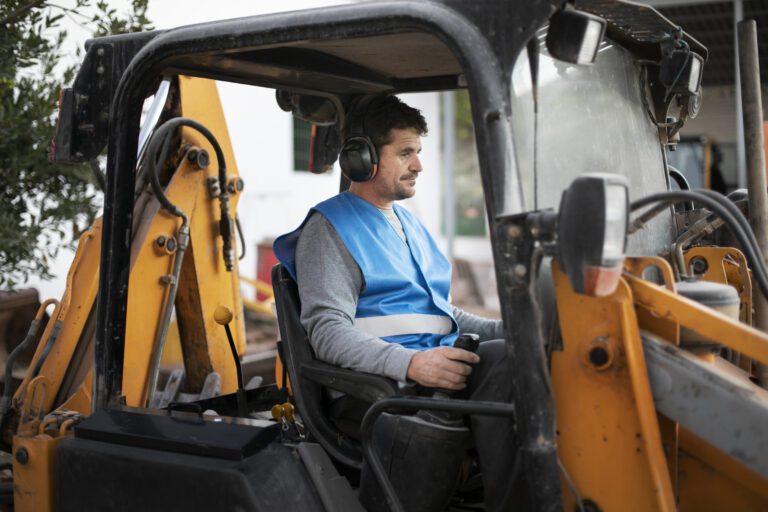
Hull (Kingston upon Hull) is a historic port city in East Yorkshire, England, situated on the north bank of the Humber Estuary. It has a rich maritime heritage, having developed around its strategic location where the River Hull meets the Humber. Originally founded in the 12th century, Hull grew into an important trading hub in the Middle Ages and later became a centre for whaling and fishing in the 18th and 19th centuries. Despite facing economic challenges in the late 20th century due to the decline of traditional industries, Hull has undergone significant regeneration in recent years, particularly following its status as the UK City of Culture in 2017.

Modern Hull’s economy is diverse, with a strong emphasis on renewable energy, manufacturing, logistics, healthcare, and education. One of the most prominent developments in recent years has been the growth of the renewable energy sector, particularly offshore wind. Siemens Gamesa, in partnership with Associated British Ports, has established a major wind turbine blade manufacturing facility at Alexandra Dock. This development has positioned Hull as a key player in the UK’s green energy transformation, creating hundreds of jobs and attracting further investment in the region.
Manufacturing and chemical industries also play a significant role in Hull’s economy. Companies like Croda International, Reckitt (formerly Reckitt Benckiser), and Smith & Nephew have longstanding roots in the area, producing pharmaceuticals, personal care products, and medical equipment. These firms are central to Hull’s industrial identity and contribute heavily to both local employment and global exports.
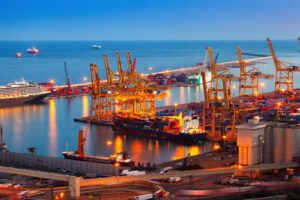
The port of Hull remains a critical asset for trade and logistics. Operated by Associated British Ports (ABP), it serves as a gateway for freight and passenger ferries to Europe, particularly the Netherlands and Belgium. The port supports a wide range of commercial activities, including the import and export of goods like timber, steel, and food products, and is integral to the region’s supply chain infrastructure.
Education and healthcare are also significant employers, with the University of Hull providing both academic and research contributions to the city’s development. The healthcare sector, anchored by Hull University Teaching Hospitals NHS Trust, supports a large workforce and serves a wide geographical area.
In summary, Hull is a city with a strong industrial legacy that is reshaping itself through innovation and investment in future-facing industries, particularly in sustainability and green energy, while still maintaining a foundation in manufacturing and trade.
Kingston upon Hull sits on the north bank of the Humber Estuary and is surrounded by a mix of towns and villages such as Hessle, Cottingham, Beverley, Hedon, Willerby, and Anlaby. These settlements developed around the waterways, fertile farmland, and transport routes that connect Hull to the wider East Riding of Yorkshire. Hull has long acted as the main commercial and industrial centre for the area, while surrounding towns and villages supported trade, agriculture, and housing for workers.
Historically, Hull’s growth as a major port strongly influenced nearby communities. Fishing, shipping, and trade through the Humber provided employment not only in the city but also in places like Hessle and Hedon, where shipbuilding, fishing-related work, and maritime services developed. Inland towns such as Beverley and Cottingham remained more agricultural, supplying food and raw materials to the port and city markets.
In the modern era, industry across the Hull area has diversified. Logistics, warehousing, food processing, and manufacturing are important employers, supported by strong road, rail, and port links. The growth of renewable energy, particularly offshore wind, has also brought new industry to Hull and surrounding towns, creating jobs in engineering, assembly, and port services.
Today, the towns and villages around Hull reflect a balance between historic rural and maritime industries and modern economic activity. Agriculture remains important in the wider countryside, while industry, services, education, healthcare, and commuting play a growing role, with Hull continuing to act as the economic hub for the region.
For these businesses and industries, staying compliant with the Lifting Operations and Lifting Equipment Regulations 1998 (LOLER) is not just a legal requirement—it’s also about safeguarding your employees, protecting your business reputation, and ensuring your equipment remains safe and reliable.
LOLER regulations place strict duties on business owners and equipment operators. Any business in Hull that owns or operates lifting equipment must ensure that:
Lifting equipment is safe to use.
Examinations are carried out at regular, legally required intervals.
Inspections are conducted by a competent and impartial person.
Failure to comply can lead to heavy fines, prosecution, and serious safety risks.
At SEIS, we know that every business in Hull – whether in heavy industry, healthcare, education, or automotive—depends on reliable, safe equipment. Regular LOLER inspections reduce the risk of accidents, protect your workforce, and ensure smooth day-to-day operations. Compliance not only keeps you legal, but also demonstrates a strong commitment to employee safety.
Book LOLER InspectionA thorough examination under LOLER is a detailed and legally required inspection of lifting equipment. Unlike simple checks or maintenance tasks, a LOLER examination must be performed by an impartial, competent person and results in an official Report of Thorough Examination.
How often your lifting equipment in Hull needs to be inspected & tested depends on its type and use:
Every 6 months – For lifting equipment used to lift persons (e.g., passenger lifts, wheelchair lifts, patient hoists), or lifting accessories and attachments.
Every 12 months – For other lifting equipment (e.g., cranes, forklifts, goods lifts).
After significant changes or repairs – Equipment must be inspected immediately if it has been modified, damaged, or relocated.
LOLER requires inspections to be carried out by a competent and independent person—not by the equipment supplier or operator. At SEIS, we meet these exact criteria. Our inspections are impartial, unbiased, and always in line with UK regulations.
Book LOLER InspectionBusinesses in Hull use a vast range of lifting equipment, and at SEIS we provide LOLER inspections across them all.
Passenger lifts
Goods lifts
Vehicle lifts
Wheelchair and platform lifts
Overhead travelling cranes
Mobile cranes
Forklift trucks
Lifting tackle and accessories
Slings (chains, ropes, webbing)
Shackles and hooks
Lifting beams and frames
Chain blocks and lever hoists
No matter the type of equipment on your site, SEIS ensures every examination is completed thoroughly, with full reports for your compliance records.
Book LOLER Inspection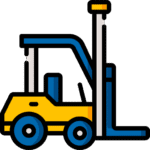
A thorough examination on a fork lift truck or reach truck ensures all safety critical components are identified in line with SAFed guidance MLCC 07, and the plant is examined in line with SAFed guidance LG 4. This includes a full structural integrity assessment, referencing specific guidances such as BS ISO 5057:2022 for fork arm inspections, and testing of any safety systems present.
Fork Lift - Learn More Reach Truck - Learn More

A thorough examination on a crane (all variants) ensures all safety critical components are identified in line with SAFed guidance MLCC 07, and the plant is thoroughly examined. This includes a full structural integrity assessment, referencing specific guidances such as BS ISO 4309:2017 for rejection criteria of the steel wire hoisting rope, and testing of any safety systems present.

A thorough examination on a motor vehicle lifting table (all variants) ensures all safety critical components are identified in line with SAFed guidance MLCC 07, and consideration is given to SAFed guidance MLCC 13 whilst the plant is thoroughly examined. This includes a full structural integrity assessment, referencing specific guidances such as BS ISO 4309:2017 for rejection criteria of the steel wire hoisting rope, any manufacturers guidance for inspection of load nuts and safety nuts, and testing of any safety systems present
Vehicle Lift - Learn More Vehicle Jack - Learn More

A thorough examination on chain hoists, lifting tackle and lifting attachments (all variants) ensures all safety critical components are identified in line with SAFed guidance MLCC 07, and the plant is thoroughly examined. This includes a full structural integrity assessment, referencing specific guidances such as BS ISO 4309:2017 for rejection criteria of the steel wire hoisting rope, PM28 for non-integrated work platforms, and testing of any safety systems present.
Lifting Tackle- Learn More Lifting Attachment - Learn More
Chain Hoist - Learn More

A thorough examination on Passnger/Goods lift (all variants) ensures all safety critical components are identified in line with SAFed guidance MLCC 07, and consideration to SAFed guidance LG 01 is applied whilst the plant is thoroughly examined. This includes a full structural integrity assessment, referencing specific guidances such as SAFed LG01 for rejection criteria of the suspension ropes, any further manufacturers specific guidance for inspection and rejection criteria of suspension ropes, and testing of any safety systems present.

A thorough examination on Platform lifts (all variants) ensures all safety critical components are identified in line with SAFed guidance MLCC 07, and consideration to SAFed guidance LG 01 is applied whilst the plant is thoroughly examined. This includes a full structural integrity assessment, referencing specific guidances such as SAFed LG01 for rejection criteria of the suspension ropes, any further manufacturers specific guidance for inspection and rejection criteria of suspension ropes, manufacturers criteria on load nut rejection, and testing of any safety systems present.

A thorough examination on a vacuum lifting machine (all variants) ensures all safety critical components are identified in line with SAFed guidance MLCC 07. This includes a full structural integrity assessment, referencing specific manufacturers guidances, and testing of any safety systems present.

A thorough examination on a Mobile Elevating Work Platform (MEWP) ensures all safety critical components are identified in line with SAFed guidance MLCC 07. This includes a full structural integrity assessment, referencing specific manufacturers guidances, and testing of any safety systems present.
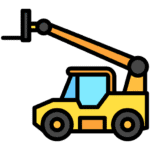
A thorough examination on a fork lift truck ensures all safety critical components are identified in line with SAFed guidance MLCC 07. This includes a full structural integrity assessment, referencing specific guidances such as BS ISO 5057:2022 for fork arm inspections, and testing of any safety systems present.

A thorough examination on a fork lift truck ensures all safety critical components are identified in line with SAFed guidance MLCC 07. This includes a full structural integrity assessment, referencing specific manufacturers guidances, and testing of any safety systems present.
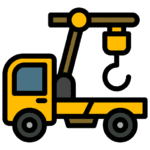
A thorough examination on a lorry mounted crane/ HIAB (all variants) ensures all safety critical components are identified in line with SAFed guidance MLCC 07, and consideration is given to BS 7121-2-4:2013 whilst the plant is thoroughly examined. This includes a full structural integrity assessment, referencing specific guidances such as BS ISO 4309:2017 for rejection criteria of the steel wire hoisting rope, and testing of any safety systems present (RCI & RCC).

A thorough examination on a personnel hoist, stair lift/ wheel chair stair lift and personnel sling (all variants) ensures all safety critical components are identified in line with SAFed guidance MLCC 07, and the plant is thoroughly examined.This includes a full structural integrity assessment, referencing specific manufacturers guidances, and testing of any safety systems present.
Patient Hoist - Learn More Stair Lift- Learn More

A thorough examination on a fork lift truck or reach truck ensures all safety critical components are identified in line with SAFed guidance MLCC 07, and the plant is examined in line with SAFed guidance LG 4. This includes a full structural integrity assessment, referencing specific guidances such as BS ISO 5057:2022 for fork arm inspections, and testing of any safety systems present.

A thorough examination on a fork lift truck or reach truck ensures all safety critical components are identified in line with SAFed guidance MLCC 07. This includes a full structural integrity assessment, referencing specific manufacturers guidances regarding load testing, referencing of MLCC01 for load chain elongation (if fitted) and testing of any safety systems present.

SEIS is proud to support Hull businesses with impartial, expert inspections. We understand the local industries, from the port to food production, and we tailor our service to meet your needs.
As an independent inspection provider, we do not sell or repair lifting equipment. This means you can trust our assessments to be impartial, unbiased, and fully in line with LOLER regulations.
Our team of qualified surveyors have years of hands-on experience across multiple industries. They know exactly what to look for and how to ensure your business remains compliant without unnecessary disruption.
We understand that downtime costs money. That’s why we work around your production schedule, conducting inspections efficiently and professionally so your operations continue smoothly.
Book LOLER InspectionWe make LOLER inspections & testing straightforward and hassle-free for local businesses.
Simply get in touch with our team, and we’ll arrange a time that works for you.
Our engineer surveyors visit your site and carry out thorough examinations with minimal disruption.
After each inspection, you’ll receive a clear, detailed report highlighting any defects and recommended actions.
We’ll manage your inspection schedule, reminding you before your next due date. Plus, you’ll have access to our online reporting portal, so your certificates are always at your fingertips.
Book LOLER InspectionChoosing the right inspection provider makes all the difference. Here’s why Hull businesses trust SEIS:
From the heavy industry and food manufacturing to hospitals, schools, and garages, we understand the unique challenges businesses here face.
We provide inspections for:
Heavy industry
Education
Healthcare
Automotive
We pride ourselves on safety, compliance, and customer service—always putting your needs first.
Hull’s full name is Kingston upon Hull.
It is a port city located on the north bank of the Humber Estuary in East Yorkshire.
Hull was founded in the late 12th century as a trading port.
The city has a long maritime history based on fishing, shipping, and trade.
Hull played a major role in the UK’s fishing industry during the 19th and 20th centuries.
The Humber Bridge, one of the longest single-span suspension bridges in the world, connects Hull to Lincolnshire.
Hull was named UK City of Culture in 2017.
The city suffered extensive damage during World War II due to bombing raids.
Hull is home to several museums, many of which offer free entry.
Today, Hull’s economy includes ports and logistics, manufacturing, renewable energy, education, and healthcare.
Booking with SEIS is quick and easy:
✅ Call our friendly team
✅ Fill in our online booking form
✅ Get your inspection arranged around your schedule
We’ll handle the rest, ensuring your equipment is inspected thoroughly, your compliance is up to date, and your workforce is kept safe.
A LOLER inspection, or thorough examination, is a legally required check of lifting equipment to ensure it is safe, compliant, and fit for use.
Inspections are required:
Only a competent and impartial person can perform LOLER inspections. At SEIS, our independent surveyors meet these requirements.
LOLER applies to:
and all lifting accessories used at work.
Yes. Whether you run a large factory or a small garage, any business operating lifting equipment must comply with LOLER.
Non-compliance can lead to fines, legal penalties, equipment downtime, and serious safety risks for staff.
No. SEIS works around your schedule to complete inspections efficiently, minimising downtime and disruption.
You’ll get a digital Report of Thorough Examination by email and access via our secure online portal.
Yes. We manage your compliance schedule and send reminders before your equipment is due for inspection.
Yes. Alongside Hull we also cover the whole Yorkshire region. SEIS also serve neighbouring areas, such Lincolnshire and the Midlands. We also serve clients nationwide!